| Listing 1 - 10 of 17 | << page >> |
Sort by
|
Book
ISBN: 9781107513471 9781107105591 1107105595 1107513472 9781316226391 1316355500 1316349500 1316226395 Year: 2015 Publisher: New York, NY: Cambridge university press,
Abstract | Keywords | Export | Availability | Bookmark
 Loading...
Loading...Choose an application
- Reference Manager
- EndNote
- RefWorks (Direct export to RefWorks)
Terrorism, cyberbullying, child pornography, hate speech, cybercrime: along with unprecedented advancements in productivity and engagement, the Internet has ushered in a space for violent, hateful, and antisocial behavior. How do we, as individuals and as a society, protect against dangerous expressions online? Confronting the Internet's Dark Side is the first book on social responsibility on the Internet. It aims to strike a balance between the free speech principle and the responsibilities of the individual, corporation, state, and the international community. This book brings a global perspective to the analysis of some of the most troubling uses of the Internet. It urges net users, ISPs, and liberal democracies to weigh freedom and security, finding the golden mean between unlimited license and moral responsibility. This judgment is necessary to uphold the very liberal democratic values that gave rise to the Internet and that are threatened by an unbridled use of technology.
Computer. Automation --- Philosophy and psychology of culture --- General ethics --- Internet governance --- Internet --- Moral and ethical aspects --- History --- Internet governance. --- 241.66*2 --- 172 --- Governance, Internet --- Moral and ethical aspects. --- History. --- Theologische ethiek: informatie; media --- Sociale ethiek. Sociale moraal. Sociale verantwoordelijkheid --- Management --- 241.66*2 Theologische ethiek: informatie; media --- 172 Sociale ethiek. Sociale moraal. Sociale verantwoordelijkheid --- Internet - Moral and ethical aspects --- Internet - History
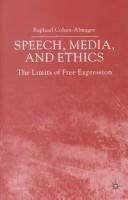
ISBN: 0333770765 Year: 2001 Publisher: Basingstoke Palgrave
Abstract | Keywords | Export | Availability | Bookmark
 Loading...
Loading...Choose an application
- Reference Manager
- EndNote
- RefWorks (Direct export to RefWorks)
Human rights --- General ethics --- Mass communications --- Freedom of speech. --- Freedom of the press. --- Mass media --- Moral and ethical aspects.
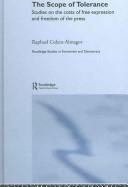
ISBN: 0415357586 0415357578 Year: 2006 Publisher: London Routledge, Taylor & Francis Group
Abstract | Keywords | Export | Availability | Bookmark
 Loading...
Loading...Choose an application
- Reference Manager
- EndNote
- RefWorks (Direct export to RefWorks)
vrijheid van meningsuiting --- 311.1 Grondwettelijke rechten en vrijheden --- Democracy. --- Freedom of speech. --- Freedom of the press. --- Toleration. --- Human rights --- Political systems --- Democracy --- Freedom of speech --- Freedom of the press --- Toleration --- Bigotry --- Intolerance --- Tolerance --- Virtues --- Discrimination --- Censorship of the press --- Liberty of the press --- Press --- Press censorship --- Censorship --- Freedom of expression --- Government and the press --- Free speech --- Liberty of speech --- Speech, Freedom of --- Civil rights --- Assembly, Right of --- Freedom of information --- Intellectual freedom --- Self-government --- Political science --- Equality --- Representative government and representation --- Republics --- Law and legislation
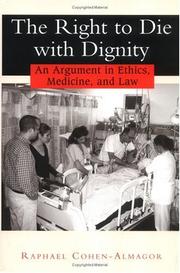
ISBN: 0813529867 Year: 2001 Publisher: New Brunswick, N.J. Rutgers University Press
Abstract | Keywords | Export | Availability | Bookmark
 Loading...
Loading...Choose an application
- Reference Manager
- EndNote
- RefWorks (Direct export to RefWorks)
There are few issues more divisive than what has become known as ""the right to die."" One camp upholds ""death with dignity,"" regarding the terminally ill as autonomous beings capable of forming their own judgment on the timing and process of dying. The other camp advocates ""sanctity of life,"" regarding life as intrinsically valuable, and that should be sustained as long as possible. Is there a right answer? Raphael Cohen-Almagor takes a balanced approach in analyzing this emotionally charged debate, viewing the dispute from public policy and international perspectives. He offers an interdisciplinary, compelling study in medicine, law, religion, and ethics. It is a comprehensive look at the troubling question of whether physician-assisted suicide should be allowed. Cohen-Almagor delineates a distinction between active and passive euthanasia and discusses legal measures that have been invoked in the United States and abroad. He outlines reasons non-blood relatives should be given a role in deciding a patient's last wishes. As he examines euthanasia policies in the Netherlands and the 1994 Oregon Death with Dignity Act, the author suggests amendments and finally makes a circumscribed plea for voluntary physician-assisted suicide. This text takes a balanced approach in analyzing the emotionally charged debate of euthanasia, viewing the dispute from public policy and international perspectives. The author offers an interdisciplinary study in medicine, law, religion and ethics.
Death --- Euthanasia --- Right to die --- euthanasie --- Death, Right to --- Death with dignity --- Natural death (Right to die) --- Life and death, Power over --- Advance directives (Medical care) --- Do-not-resuscitate orders --- Suicide --- Assisted death (Euthanasia) --- Assisted dying (Euthanasia) --- Death, Assisted (Euthanasia) --- Death, Mercy --- Dying, Assisted (Euthanasia) --- Killing, Mercy --- Mercy death --- Mercy killing --- Homicide --- Medical ethics --- Assisted suicide --- Dying --- End of life --- Life --- Terminal care --- Terminally ill --- Thanatology --- Law and legislation --- Moral and ethical aspects --- Philosophy --- Professional ethics. Deontology --- Legal theory and methods. Philosophy of law --- Human rights --- Human medicine
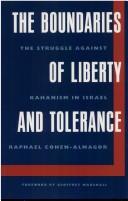
ISBN: 0813019273 9780813019277 0813012589 Year: 1994 Publisher: Gainesville, FL Orlando Jacksonville University Press of Florida
Abstract | Keywords | Export | Availability | Bookmark
 Loading...
Loading...Choose an application
- Reference Manager
- EndNote
- RefWorks (Direct export to RefWorks)
In 1985, Raphael Cohen-Almagor participated in an Israeli demonstration against Rabbi Meir Kahane, a religious, quasi-fascist propagandist who had been elected to the Israeli parliament the preceding year. As the demonstration became a confrontation - people screamed, shouted, and whistled to prevent Kahane from speaking - Cohen-Almagor felt increasing discomfort. In the name of democracy, the protesters were using the same tactics against Kahane that Kahane would use against his own opposition. Advocates of free speech were denying Kahane free speech. The paradox was the impetus behind this work, which proposes to overcome what Cohen-Almagor calls the "catch" of democracy, the idea that the principles that underlie any political system might also bring about its destruction. Building on the framework of John Stuart Mill and other liberal theorists, Cohen-Almagor addresses the delicate issue of which boundaries should be set to safeguard democracy. He contends that restrictions of liberty and tolerance may be prescribed when there are threats of immediate violence against individuals or groups, or when the intent of a threat is to inflict psychological damage in circumstances when the target group is forced to be exposed to the threat. In this connection he reviews the ruling of the Illinois Supreme Court that permitted American Nazis to hold a demonstration in Skokie, and he argues that the decision was wrong. The second part of the book explores the struggle of the Israeli political system against the Kahanist racist phenomenon as it has developed in the last two decades. Cohen-Almagor's perspective differs from that of philosophers who focus particularly on practical considerations. "My view is that the fundamental question is ethical rather than practical," he writes. "I argue that, as a matter of moral principle, violent parties that act to destroy democracy or the state should not be allowed to run for parliament." This work, both a theoretical contribution and a discussion of a major current political problem, will be valuable to political scientists, philosophers, legal scholars, and anyone interested in First Amendment issues.
Freedom of speech. --- Freedom of speech --- Liberty. --- Toleration. --- Liberty --- Toleration --- Law, Politics & Government --- Human Rights --- Bigotry --- Intolerance --- Tolerance --- Virtues --- Discrimination --- Civil liberty --- Emancipation --- Freedom --- Liberation --- Personal liberty --- Democracy --- Natural law --- Political science --- Equality --- Libertarianism --- Social control --- Free speech --- Liberty of speech --- Speech, Freedom of --- Civil rights --- Freedom of expression --- Assembly, Right of --- Freedom of information --- Intellectual freedom --- Law and legislation --- Kahane, Meir. --- Kahānā, Maʼīr --- Kahana, Meʼir --- Kahane, Martin David --- Kahane, Meir, --- King, Michael, --- כהנא, מאיר --- כהנא, מאיר דוד --- כהנא, מאיר דוד בן יחזקאל שרגא, --- Israel --- Politics and government. --- Politics and government --- Freedom of speech - Israel.
Book
ISBN: 1108567215 1108476147 110875127X 110875077X Year: 2021 Publisher: Cambridge : Cambridge University Press,
Abstract | Keywords | Export | Availability | Bookmark
 Loading...
Loading...Choose an application
- Reference Manager
- EndNote
- RefWorks (Direct export to RefWorks)
This book explores the main challenges against multiculturalism. It aims to examine whether liberalism and multiculturalism are reconcilable, and what are the limits of liberal democratic interventions in illiberal affairs of minority cultures within democracy. In the process, this book addresses three questions: whether multiculturalism is bad for democracy, whether multiculturalism is bad for women, and whether multiculturalism contributes to terrorism. Just, Reasonable Multiculturalism argues that liberalism and multiculturalism are reconcilable if a fair balance is struck between individual rights and group rights. Raphael Cohen-Almagor contends that reasonable multiculturalism can be achieved via mechanisms of deliberate democracy, compromise and, when necessary, coercion. Placing necessary checks on groups that discriminate against vulnerable third parties, the approach insists on the protection of basic human rights as well as on exit rights for individuals if and when they wish to leave their cultural groups.
Multiculturalism. --- Human rights. --- Deliberative democracy. --- Liberalism. --- Liberal egalitarianism --- Liberty --- Political science --- Social sciences --- Discursive democracy --- Democracy --- Basic rights --- Civil rights (International law) --- Human rights --- Rights, Human --- Rights of man --- Human security --- Transitional justice --- Truth commissions --- Cultural diversity policy --- Cultural pluralism --- Cultural pluralism policy --- Ethnic diversity policy --- Multiculturalism --- Social policy --- Anti-racism --- Ethnicity --- Cultural fusion --- Law and legislation --- Government policy
Book
ISBN: 9781108476140 9781108469838 9781108567213 Year: 2021 Publisher: Cambridge Cambridge University Press
Abstract | Keywords | Export | Availability | Bookmark
 Loading...
Loading...Choose an application
- Reference Manager
- EndNote
- RefWorks (Direct export to RefWorks)
"This book explores the main challenges against multiculturalism. It aims to examine whether liberalism and multiculturalism are reconcilable, and what are the limits of liberal democratic interventions in illiberal affairs of minority cultures within democracy, when minorities engage in practices that inflict physical harm and non-physical harm on group members. In the process, this book addresses three questions: whether multiculturalism is bad for democracy, whether multiculturalism is bad for women and whether multiculturalism contributes to terrorism. Just, Reasonable Multiculturalism argues that liberalism and multiculturalism are reconcilable if a fair balance is struck between individual rights and group rights. Raphael Cohen-Almagor contends that reasonable multiculturalism can be achieved via mechanisms of deliberate democracy, compromise and, when necessary, coercion. Placing necessary checks on groups that discriminate against vulnerable third parties, the approach insists on the protection of basic human rights as well as on exit rights for individuals if and when they wish to leave their cultural groups"--
Multiculturalism. --- Liberalism. --- Deliberative democracy. --- Human rights. --- LAW / General --- Philosophy and psychology of culture --- Political philosophy. Social philosophy --- Sociology of culture --- Human rights
Book
ISBN: 9783030946692 Year: 2022 Publisher: Cham, Switzerland : Springer,
Abstract | Keywords | Export | Availability | Bookmark
 Loading...
Loading...Choose an application
- Reference Manager
- EndNote
- RefWorks (Direct export to RefWorks)
Secularism. --- Social policy. --- Islam and secularism. --- Secularism and Islam --- Secularism --- National planning --- State planning --- Economic policy --- Family policy --- Social history --- Ethics --- Irreligion --- Utilitarianism --- Atheism --- Postsecularism --- Secularization (Theology)
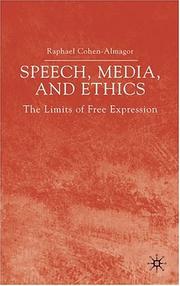
ISBN: 1403947090 Year: 2005 Publisher: Basingstoke Palgrave Macmillan
Abstract | Keywords | Export | Availability | Bookmark
 Loading...
Loading...Choose an application
- Reference Manager
- EndNote
- RefWorks (Direct export to RefWorks)

ISBN: 9781403947093 Year: 2005 Publisher: Basingstoke Palgrave Macmillan
Abstract | Keywords | Export | Availability | Bookmark
 Loading...
Loading...Choose an application
- Reference Manager
- EndNote
- RefWorks (Direct export to RefWorks)
| Listing 1 - 10 of 17 | << page >> |
Sort by
|

 Search
Search Feedback
Feedback About UniCat
About UniCat  Help
Help News
News